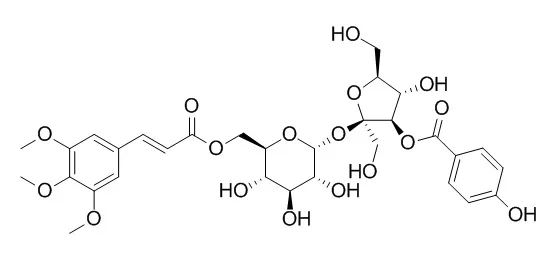| In vitro: |
| Eur J Pharmacol. 2013 Dec 5;721(1-3):267-76. | | The inhibition of JNK MAPK and NF-κB signaling by tenuifoliside A isolated from Polygala tenuifolia in lipopolysaccharide-induced macrophages is associated with its anti-inflammatory effect.[Pubmed: 24076326] | The root of Polygala tenuifolia Willd. (Polygalaceae) is well known for its use in the treatment of neurasthenia, amnesia, and inflammation.
METHODS AND RESULTS:
In this study, we isolated phenyl propanoid type metabolite Tenuifoliside A, one of the phenylpropanoids from P. tenuifolia, and investigated its anti-inflammatory effects in lipopolysaccharide (LPS)-stimulated RAW264.7 and murine peritoneal macrophages. The results showed that Tenuifoliside A inhibited the production of nitric oxide (NO), inducible nitric oxide synthase (iNOS), prostaglandin E2 (PG E2), and cyclooxygenase (COX)-2. In addition, Tenuifoliside A suppressed the production of pro-inflammatory cytokines, such as tumor necrosis factor (TNF)-α and interleukin (IL)-1β. We also evaluated the effects of Tenuifoliside A on the activation of nuclear factor-kappaB (NF-κB). Tenuifoliside A inhibited the translocation of the NF-κB subunit p65 into the nucleus by interrupting the phosphorylation and degradation of inhibitor kappa B (IκB)-α in LPS-stimulated murine peritoneal macrophages. Moreover, we confirmed that the suppression of the inflammatory process by Tenuifoliside A was mediated through the mitogen-activated protein kinases (MAPKs) pathway based on the fact that Tenuifoliside A significantly decreased p-c-Jun N-terminal kinase (p-JNK) protein expression in LPS-stimulated murine peritoneal macrophages. Taken together, the anti-inflammatory effects of Tenuifoliside A were mediated by the inhibition of the NF-κB and MAPK pathways.
CONCLUSIONS:
This study is the first report on the anti-inflammatory effects of Tenuifoliside A, and the strong anti-inflammatory effects of Tenuifoliside A provide potential compound to be developed as therapeutic for inflammatory diseases. | | Rev Neurosci. 2015;26(3):305-21. | | Plant-derived natural medicines for the management of depression: an overview of mechanisms of action.[Pubmed: 25719303] | Depression is a serious widespread psychiatric disorder that affects approximately 17% of people all over the world. Exploring the neurological mechanisms of the antidepressant activity of plant-derived agents could have a crucial role in developing natural drugs for the management of depression.
METHODS AND RESULTS:
The aim of the present study is to review the neurological mechanisms of action of antidepressant plants and their constituents. For this purpose, electronic databases, including PubMed, Science Direct, Scopus, and Cochrane Library, were searched from 1966 to October 2013. The results showed that several molecular mechanisms could be proposed for the antidepressant activity of medicinal plants and their constituents. Hypericum species could normalize brain serotonin level. Liquiritin and isoliquiritin from Glycyrrhiza uralensis rhizome act via the noradrenergic system. Rosmarinus officinalis and curcumin from Curcuma longa interact with D1 and D2 receptors as well as elevate the brain dopamine level. Sida tiagii and Aloysia gratissima involve γ-aminobutyric acid and N-methyl-D-aspartate receptors, respectively. Fuzi polysaccharide-1 from Aconitum carmichaeli could affect brain-derived neurotrophic factor signaling pathways. Psoralidin from Psoralea corylifolia seed modulate the hypothalamic-pituitary-adrenal axis. The total glycosides of Paeonia lactiflora demonstrate an inhibitory effect on both subtypes of monoamine oxidase. 3,6'-Di-o-sinapoyl-sucrose and Tenuifoliside A from Polygala tenuifolia exhibit cytoprotective effects on neuronal cells.
CONCLUSIONS:
Further preclinical and clinical trials evaluating their safety, bioefficacy, and bioavailability are suggested to prove the valuable role of natural drugs in the management of depressive disorders. |
|
| In vivo: |
| Phytomedicine. 2010 Aug;17(10):794-9. | | Potential antidepressant properties of Radix Polygalae (Yuan Zhi).[Pubmed: 20541923] | Radix Polygalae ("Yuan Zhi", the roots of Polygala tenuifolia Willd., YZ) is an important herb used in traditional Chinese medicine to mediate depression.
METHODS AND RESULTS:
The present study was designed to verify the antidepressant effects of the standardized YZ ethanol extract (YZE) and its four fractions YZ-30, YZ-50, YZ-70 and YZ-90 on the tail suspension (TST) and forced swimming test (FST). Furthermore, the standardization of the fractions obtained from the separation procedures was carried out by high-performance liquid chromatography (HPLC)-fingerprint. The YZ-50 fraction (Oligosaccharide esters--enriched, oral (200 mg/kg) showed a significant anti-immobility like effects. The data of YZ-50 on the corticosterone-induced injure of SH-SY5Y human neuroblastoma cell indicated that YZ-50 may have biological effects on neuroprotection. Proliferation of cell lines was assessed by dimethylthiazoldiphenyltetrazoliumbromide (MTT) and 5-bromo-2'-deoxyuridine (BrdU) incorporation assays. It was found that YZ-50 and its two bioactive compounds, 3,6'-di-o-sinapoyl-sucrose (DISS) and Tenuifoliside A(TEA) showed protection activities in SY5Y cells from the lesion.
CONCLUSIONS:
By using bioassay-screening methods, our results indicate that the presence of oligosaccharide esters such as DISS and TEA in this herb may be responsible for the cytoprotective activity effects. |
|






 Cell. 2018 Jan 11;172(1-2):249-261.e12. doi: 10.1016/j.cell.2017.12.019.IF=36.216(2019)
Cell. 2018 Jan 11;172(1-2):249-261.e12. doi: 10.1016/j.cell.2017.12.019.IF=36.216(2019) Cell Metab. 2020 Mar 3;31(3):534-548.e5. doi: 10.1016/j.cmet.2020.01.002.IF=22.415(2019)
Cell Metab. 2020 Mar 3;31(3):534-548.e5. doi: 10.1016/j.cmet.2020.01.002.IF=22.415(2019) Mol Cell. 2017 Nov 16;68(4):673-685.e6. doi: 10.1016/j.molcel.2017.10.022.IF=14.548(2019)
Mol Cell. 2017 Nov 16;68(4):673-685.e6. doi: 10.1016/j.molcel.2017.10.022.IF=14.548(2019)